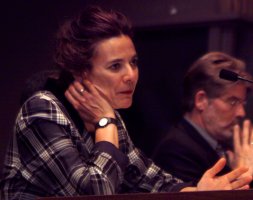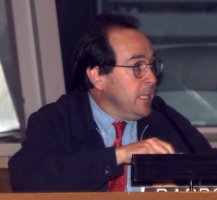 |
|
UNEP-UNCTAD Task force on capacity building
in trade, environment and development
The
UNEP and UNCTAD Capacity Building Task Force on Trade, Environment
and Development (CBTF), an effort to further strengthen country
capacities to promote trade expansion and develop their economies
in an environmentally friendly and sustainable manner, is being
initially implemented for a three-year period, with a continuation
of its existence after a review of implementation results in 2002.
The CBTF was conceived, in response to expressed needs and requirements
of governments, to combine the unique strengths of UNEP to build
capacities on environmental aspects of trade, and of UNCTAD to build
capacities on the development aspects of trade. It also seeks to
build synergies and enhance coordination between organizations working
in the trade-development-environment domain. Activities will include
thematic research, country studies, training, policy dialogue, and
networking and information exchange.
|
|
Rene
Vossenaar, UNCTAD, and Charles Arden-Clarke, Senior Economic Affairs
Officer
|
|
Veena
Jha, UNCTAD, discussed country specific cases including controlling
vehicular pollution in India and water policy changes in the Philippines
|
|
|
International Commemoration Day for Dead and
Injured Workers
On 28
April, 1999, the International Confederation of Free Trade Unions
(ICFTU) lit a memorial Candle and incense at the UN for the
First International Commemoration Day to highlight the plight of
workers from unsustainable forms of production. Since then, individuals
and organizations from throughout the world have been involved in
28 April ceremonies to pay tribute to dead, injured and sick workers.
A Candlelight Ceremony was intended to highlight the positive transformation
that should flow from the activities of people who have worked and
died while promoting sustainable development. It was also held for
Michael McCoy, a Pioneer of NGO Organizing at the CSD. The event
concluded with a kickoff of a new "World Harmony Network for
Sustainable Development, in keeping with Michael's special bent
for music and harmony.
|
|
Michael
McCoy's mother (left) with friends and colleagues (right)
|
|
Expert Panel Discussion on Global Partnership
for Sustainable Land Management ensuring Food Security Organized
by FAO.
With an increasingly
urbanized society, Sustainable Agriculture and Rural Development (SARD)
is needed more today than ever. Rural areas and livelihoods
are at risk due to the higher demands of urban areas, and
competition from other land-uses. The Expert Panel
discussion presented commentary on different facets their
experiences while looking toward the exploration of new
partnerships and synergies.
|
 |
The
FAO representative
Bo
Kjellen,
Ministry of Foreign Affaris, Sweden, chaired the panel discussion
|
|
|
|
Dr.
Doorenbooss, President of the International Federation of Agricultural
Producers (IFAP) states that sustainable land
management is dependant upon the alleviation of poverty. Unequal
distribution of resources,
and neglect of
the
agricultural sector by governments is at the base, but
improvements can be made by strenghtening farmer organzations and
workign with local leaders at the grassroots in order to
strengthen national organizations. He also called for action
from governments to provide public services for rural development
in infrastructures, and calle for action from financial
institutions to innovate new farm-friendly credit policies and
investment programs.
|
|
Dr.
Moise Mensa, former President of IFAD,
|
|
|
|
M.
Karanja, Chief Executive of Kenya National Farmers Union (KNFU),
advocated for participatory processes, continued public-sector
support, and the involvement of traditionally marginalized groups,
such as women.
|
|
JNL
Srivastava, Special Secretary, Ministry of Agriculture, India
|
|
 |
Miguel
Altieri, University of California, Berkeley, outlined
successful sustainable agricultural practices, which have
recovered degraded land, have developed communities, and provided
food security for marginalized peoples. His slide show
illustrated how plants were used for natural terracing on
mountainous terrain, fallow systems that improve soils
conservation, integrated crop-livestock farming, crop rotations,
and methods to reduce soil erosion. Altieri
also described innovative cost-saving techniques for small-scale
farmers, and stated that its possible to recover total landscapes
through visioning exercises, and collaboration with hydrologists,
soil scientists, and communities to realize those goals.
|

 ENB Summary of Ad Hoc Open-Ended Intergovernmental Group of Experts on
Energy and Sustainable Development
ENB Summary of Ad Hoc Open-Ended Intergovernmental Group of Experts on
Energy and Sustainable Development
 CSD-8 Intersessionals
CSD-8 Intersessionals
 Linkages CSD page
Linkages CSD page
 UN
- CSD website with official
documents UN
- CSD website with official
documents
 ENB's "Introduction to CSD"
ENB's "Introduction to CSD"

|